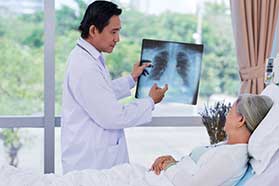Pneumonia Treatment in Hampton Falls, NH

Ever had a flu that hung around way too long or developed into a “chest cold”? Chances are, you may have had a lung infection known as pneumonia. While most cases resolve after time and rest, for the old and young alike, pneumonia can be a very serious illness. The World Health Organization (WHO) states that pneumonia is to blame for 15% of deaths of children under the age of 5.
Pneumonia Symptoms
While the signs of pneumonia can mimic and even develop from the common cold or flu, things can progress into dangerous territory rather quickly. At its core, pneumonia is an inflammatory infection that affects the alveoli (sacs in the lung that hold air) with symptoms including:
- Fever (even in excess of 102 degrees F, requiring immediate medical attention)
- Coughing
- Chest pain
- Fatigue
- Nausea
- Vomiting
- Diarrhea
- Hypothermia (low body temp, typically experienced by sufferers over the age of 65)
- Tachycardia (rapid heart rate)
- Bacteremia (bacteria in lungs)
- Abscess
- Pleural effusion (fluid-up in the chest around the heart)
- Severe trouble breathing
The trouble is, that with early symptoms of pneumonia mimicking a cold, and—in some cases—pneumonia developing from a cold/flu itself, treatment is typically postponed as people wait for the infection to pass. This only gives the infection time to worsen however.
Types of Pneumonia
There are several types of pneumonia, some typically mild while others have a history of becoming more severe. The most common forms of pneumonia include:
Walking Pneumonia (pneumonia that typically doesn’t require bed rest):
- Bacterial pneumonia (Streptococcus pneumoniae): More commonly known as strep. This type of pneumonia—according to WHO—is the most common in children.
- Heamophilus influrnzae: This is bacterial pneumonia, if left untreated can be very serious.
- Viral: As the name suggests, this type is contracted as a result of a viral infection such as the cold.
- Fungal: After coming into contact with particular strain of fungi, those with compromised immune systems can develop what is called fungal pneumonia.
- Mycoplasma: Splitting the difference between viral and bacterial, mycoplasma organisms can generate typically mild cases of pneumonia.
Acquired pneumonia (obtained from another source):
- Hospital acquired: Those who are on a ventilator are at greater risk for developing pneumonia.
- Healthcare acquired: People who reside in nursing/ assisted care facilities are also at greater risk.
- Aspiration: A result of inhaling food, liquid, dust, and gasses.
Pneumonia Treatment
Pneumonia diagnosis and treatment is relatively straight forward, unless a complicated case presents. The first step is a series of tests: X-ray, CT scan, blood test , pulse oximetry (oxygen stats), sputum analysis (the analysis of purulent material in your lungs, fluid, puss, phlegm) as well as a purulent culture.
Once the type of pneumonia is confirmed, treatment can begin. Many are given antibiotics, anti-cough meds, but severe cases may require monitoring and breathing assistance from trained professionals. Preventative treatment comes in the form of pneumonia vaccines.
If you have what feels like a cold or flu that just won’t go away, you may want to check with your nearest doctor about the possibility of pneumonia.
Request more information about the Pneumonia Treatment today. Call (207) 536-9661 or contact Vibrant Health Naturopathic Medical Center online.
Vibrant Health Naturopathic Medical Center
Address
3 Riverside DriveGreenland, NH 03840
(207) 536-9661
www.vibranthealthnaturalmedicine.com
Hours
Mon:
8:30 am - 5:00 pm
Tue:
9:00 am - 5:00 pm
Wed:
10:30 am - 5:00 pm
Thu:
9:00 am - 5:00 pm
Fri:
10:00 am - 4:00 pm
Sat:
Closed
Sun:
Closed

